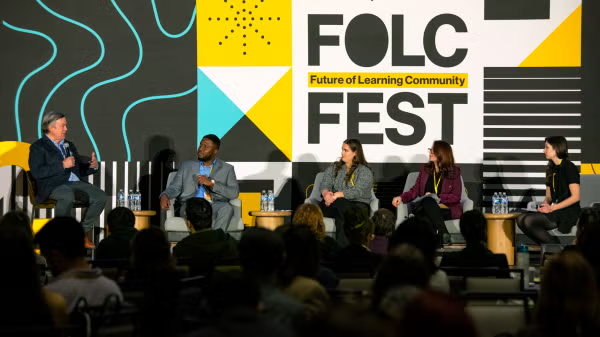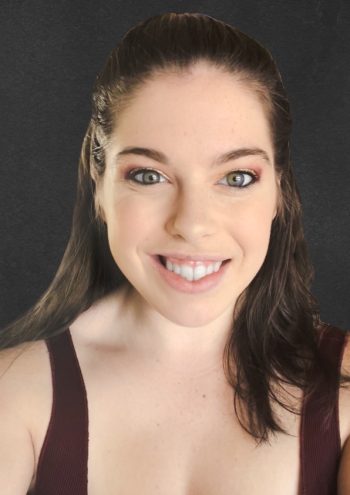ASU SAILS gives student second chance at college
Maeve Moore is a ASU Online student in the Cronkite School, majoring in mass communication and media studies. Part of the reason she chose her major is for the opportunity to spread awareness about Tourette syndrome.
Having dreamed of going to college since fifth grade, Maeve Moore was devastated when she had to drop out.
Moore, a mass communication and media studies major from Oklahoma, was diagnosed with Tourette syndrome at age 19. When her symptoms interfered with her college coursework, Moore thought the university she was attending at the time would be able to help her. Instead, she encountered little to no support from faculty and staff.
“It just started to get really difficult to want to go to class in general,” Moore said. “I was so sick of the treatment that I was getting. ... I knew that I wanted to go back, but I didn’t know how I was going to do it.”
But Moore and students like her, who thought they would never have a chance at a four-year college degree, have found a second chance with ASU Online and the Walter Cronkite School of Journalism and Mass Communication.
Arizona State University provides disability resources and accommodations for online and on-campus learners through Student Accessibility and Inclusive Learning Services (SAILS).
And like Moore, others are discovering that ASU’s online classes, structure and services are ideally suited to accommodate students who need additional support.
“I didn’t think in a million years I would be at college again,” Moore said.
People with Tourette syndrome exhibit tics, which can vary in type from simple to complex. For Moore, those tics are sometimes head movements or saying words like “wow” in the middle of a conversation. But they can also be more than that.
A “tic attack” can occur when someone with Tourette syndrome holds their tics in for an extended period of time, such as when going to school, work or grocery shopping.
Moore said she suppresses her tics because it’s easier to avoid awkward social situations, but when the strain finally catches up, her tic attacks can last anywhere from 10 minutes up to 12 hours.
“Whenever you have to hold your tics in for a long period of time, which I do a lot unconsciously when out in public, they have to all come out eventually,” she said. “It’s just a huge amount of tics. It can be a really exhausting thing and a really scary thing when it happens. It’s impossible for me to get schoolwork done at that point because I can’t even touch my laptop."
Tic attacks were one of the biggest challenges for Moore while attending classes in person and ultimately led to her dropping out.
But before giving up her dream of college completely, she decided to give it one more shot.
“I knew I still wanted to get a degree,” she said. “I knew that was still an end goal of mine, especially now that I did have this diagnosis. I wanted to prove so many people wrong. ... Just because you have a disability, you can still push, you can still do the things that other people do. So I decided it was time to do online college.”
Finding support, embracing self-advocacy
The decision to apply to ASU Online was an easy one. Her brother is a former Sun Devil who enjoyed his time at ASU, and she thought it might also be a right fit for her.
Her application was accepted within a matter of weeks.
“Being accepted into another college after I’d already withdrawn (from another), and after I’d already done all these things, was just mind-boggling,” Moore said.
Committed to accessible education and inclusivity, ASU provided a community that was invested in her success.
SAILS enables both on-campus and online students with disabilities to discuss accommodations that would allow them to have equal access to programs and courses.
“Like other resources provided to students at the university, SAILS is here to support students and ensure they have access to their education,” said Chad Price, director of operations for SAILS. “If you are not sure if you might qualify, it never hurts to ask.”
Moore’s conversation with SAILS exceeded her expectations.
“I didn’t expect a lot, I’m not going to lie, purely for the fact of how I’ve been treated in the past — not only just by my school but by my peers, by my friends,” she said.
It was the team at SAILS that, for the first time since her diagnosis, asked her about her Tourette syndrome and what she needed to complete her courses.
“The impact of a disability may be different for students who have a similar disability,” Price said. “It’s critical in understanding the individual situation and the specific impact the disability has on them. Our access consultants work with students directly as things are considered on a case-by-case and course-by-course basis.”
Some of the accommodations Moore received showed how much ASU Online understood her unique challenges.
“You can’t really plan a lot with Tourette,” she said. “But ASU Online and my professors understood that, and if they didn’t understand that, they let me explain it to them. That’s the difference. They’re allowing me to speak my voice instead of speaking to me about how I am.”
Insensitivity and misunderstanding, Moore explained, are part of a bigger problem: lack of communication.
“There’s not a lot out there about Tourette, you know,” she said. “It’s not something that’s really talked about a lot. And when it is talked about, it’s mostly misinformed information, which is very unfortunate for people with Tourette syndrome.”
Moore has a plan to change that. Part of the reason she chose her major is for the opportunity to spread awareness about TS.
“Life is going to throw some weird turns and twists at you that you’re not going to expect. Mine was Tourette syndrome, an incurable diagnosis of a neurological disease, but you know, everybody has their thing they have to get through in life, and that’s OK. So the best thing I can do is spread awareness and make people understand what I go through so that they can understand rather than judge.”
Moore hopes that talking about her disability and the support she received will help normalize conversations around accessibility.
“I didn’t have the same opportunity to learn at my first college that I did at ASU Online,” Moore said. “If I hadn’t had the accessibility of going online or getting the accommodations that I did, I wouldn’t be in the same situation I am now. My whole life would be different.”
More Sun Devil community

How 2 women who call each other 'sis' raised ASU running back Kyson Brown
The Lancaster High School graduation ceremony has just ended, and running back Kyson Brown poses for a photo with the two most…

FOLC Fest 2025 explores Principled Innovation, leadership and learning at ASU
"Principled Innovation is about using our creativity, knowledge and resources to make decisions that ultimately benefit humanity…

These Sun Devils are inspiring the next generation of female athletes
This year, Women's History Month is celebrating the theme “Moving Forward Together! Women Educating and Inspiring Generations.”…


